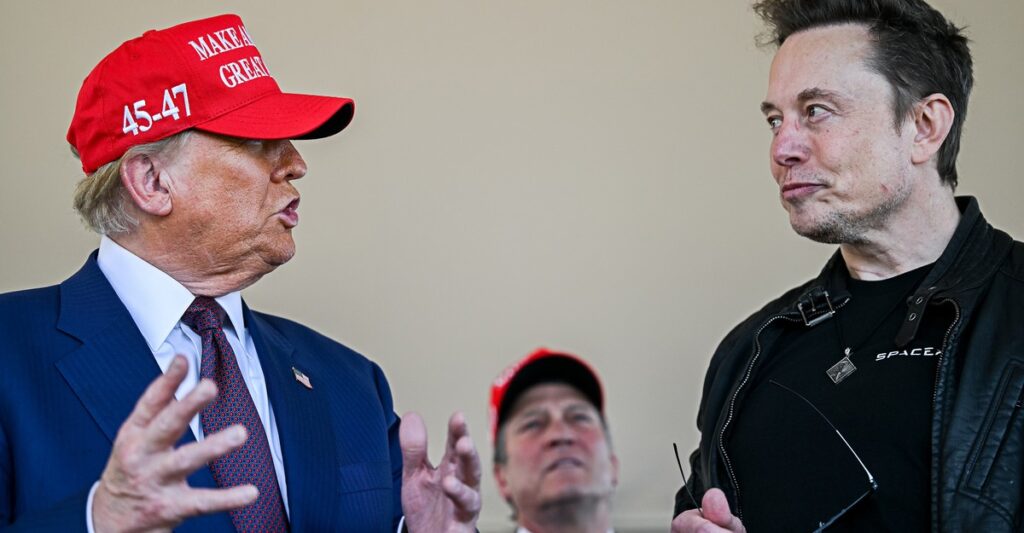Elon Musk spent Christmas Day online, in the thick of a particularly venomous culture war, one that would lead him to later make the un-Christmas-like demand of his critics to “take a big step back and FUCK YOURSELF in the face.”
Donald Trump had ignited this war by appointing the venture-capitalist Sriram Krishnan to be his senior AI-policy adviser. Encouraged by the MAGA acolyte and expert troll Laura Loomer, parts of the far-right internet melted down, arguing that Krishnan’s appointment symbolized a betrayal of the principles of the “America First” movement.
Krishnan is an Indian immigrant and a U.S. citizen who, by virtue of his heritage, became a totem for the MAGA right to argue about H-1B visas, which allow certain skilled immigrants to work in the United States. (Many tech companies rely on this labor.) In response to Krishnan’s appointment, some right-wing posters used racist memes to smear Indians, who have made up nearly-three quarters of H-1B recipients in recent years. Loomer called such workers “third world invaders” and invoked the “Great Replacement” theory, which claims that America’s white population is being purposefully replaced by nonwhite people from other countries.
Although Musk has seemingly embraced white supremacy on the platform he owns, X, he apparently could not stand for an attack on a government program that has helped make him money. He is himself an immigrant from South Africa who has said that he worked in the U.S. under an H-1B visa before becoming a citizen. Musk also employs such workers at his companies. He posted on X in support of the H-1B program, arguing that it brings elite talent to America. This perspective is not remotely controversial for the Silicon Valley set, but the reactionary and nationalist wings of the Republican Party got very upset with Musk, very quickly. “The American people don’t view America as a sports team or a company,” the provocateur Jack Posobiec wrote in response to one of Musk’s tweets on Thursday. “They view it as their home.” Later, Musk warned his critics that he will “go to war on this issue the likes of which you cannot possibly comprehend.” By the weekend, Steve Bannon, Trump’s former adviser, had called H-1Bs a “scam” and said that Musk’s defense of highly skilled immigrants is showing his “true colors.”
The tech right and nationalist right are separate (but overlapping) factions that operated in tandem to help get Trump reelected. Now they are at odds. For possibly the first time since Trump’s victory, the racial animus and nativism that galvanized the nationalist right cannot immediately be reconciled with the tech right’s desire to effectively conquer the world (and cosmos, in Musk’s case) using any possible advantage. After winning the election together, one side was going to have to lose.
It should be said that opposing H-1Bs is not an inherently MAGA position. The program has well-documented flaws, and has received bipartisan criticism. For instance, Senator Bernie Sanders, an independent, has previously argued that highly skilled immigrant labor is a potential weapon that business owners can use to lower wages. Similarly, supporting H-1Bs says only so much about someone’s politics. Although Musk casts his defense of highly skilled immigrants as racially inclusive, he has repeatedly flirted with racial prejudice on X and has vocally supported a German far-right party with ties to neo-Nazis.
In any case, the coalition of the tech right and the nationalist right was bound to be tested. The two are similar in certain ways: They share a reactionary, anti-“woke” commitment to reversing a perceived pattern of American weakness brought about by DEI initiatives, and both have exhibited authoritarian tendencies. But there were always fissures. The tech right’s desire for free markets is in fundamental tension with a rising conservative skepticism of unchecked capitalism; Tucker Carlson, for example, has spoken critically of “market capitalism,” arguing that “any economic system that weakens and destroys families isn’t worth having.” Much of the nationalist far right sees itself as a movement that values the flourishing, vitality, and self-determination of human beings (as long as they are of the correct race or nationality). Meanwhile, much of the tech right is concerned with advancing technology above all else—the most extreme wings don’t even mind if that ultimately results in human extinction.
For a little while, it almost seemed like the right could dodge these conflicts. Vice President–Elect J. D. Vance is the physical embodiment of a compromise between the far-right, aggressively reactionary, nationalist wing of the Republican Party and its tech-evangelist faction. He worked in a venture-capital firm co-founded by Peter Thiel, the right-wing tech billionaire; has criticized unbridled free markets; and has been cheered on by far-right influencers with big followings. He has spoken out against H-1B visas even as he invested in companies that applied to use them. But part of Vance’s job is to unite his party against a common enemy; that role became less urgent after Election Day.
This skirmish is a preview of how tension between the tech right and the nationalist right may play out once Trump takes office. The nationalists will likely get most of what they want—Trump has already promised mass deportations, to their delight—but when they butt heads with Silicon Valley, Trump will likely defer to his wealthiest friends. That’s how things went during his first term. Despite Trump’s populist promise in 2016 that he would create an economy that benefited common people at the expense of large corporations and the rich (a position popular with the more nationalist wing of the right), he largely did the opposite, supporting and signing into law tax cuts for corporations and the wealthy. This happened even as much of the tech world rebuked Trump over his “Muslim ban” and family-separation policy, which employees of tech giants prodded their leaders to oppose.
This time around, with Musk and the tech entrepreneur Vivek Ramaswamy running the newly created Department of Government Efficiency, the billionaire venture capitalist Marc Andreessen helping staff the department, and Krishnan set to advise on AI policy, the tech right is being integrated into the incoming administration. Trump’s other appointments also suggest that his administration will be friendly to the rich and powerful. His advisers and Cabinet appointments so far consist of ultra-rich confidants from finance and real estate—industries that prioritize markets above other conservative principles. His proposed Cabinet includes few who would be considered dedicated members of the nationalist right. No surprise, then, that Trump seemed to side with Musk, telling the New York Post on Saturday, “I’ve always liked the visas, I have always been in favor of the visas. That’s why we have them.” Perhaps even more so than last time, the plutocrats are in control.


